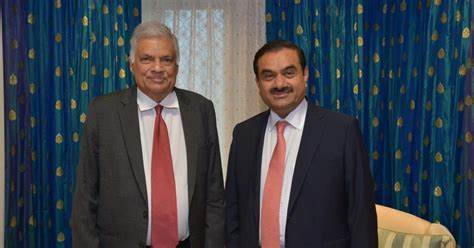
Sri Lanka with Panachayuda to Lose Economic Battle Rejecting Adani: Ranil
- CNL Reporter
- March 31, 2025
- Business News
- Adani
- 0 Comments
NEWS OF THE DAY
By Bandula Sirimanna
Sri Lanka finds itself on the precipice of both opportunity and risk as it is now out of the Intensive Care Unit after four years in economic crisis ailment, and it has to follow a path towards inclusive and transformative growth that ensures debt sustainability, avoiding future crises for the benefit of all Sri Lankans.
To address this critical need of getting discharged from the post ICU unit fully recovering from the economic ailment, the country should achieve economic development attracting foreign investments and modern technology from overseas, former Prime Minister Ranil Wickremasinghe asserted.
Mr Wickremesinghe has suggested a wider economic strategy for Sri Lanka, underlining the need for capital and technology to drive growth.
He noted that countries like China and Vietnam have successfully raised capital investment and technology from abroad and called on Sri Lanka to follow suite in order to increase per capita income as well as achieve sustainable development.
If Sri Lanka’s economy is to move beyond its current fragile state, he said that integration and cooperation with the Indian economy must be a priority
The former Premier was speaking in Rajagiriya this week at the launching ceremony of the latest book on five laws for economic sustainability and causes of economic crisis in 2022 titled “ “Arthikaye Panchayudhaya “written by former Minister Bandula Gunawardena who has already written and published more than 55 books on the subject of economics.
‘Panchayudha’ is the five divine weapons including Discus, Conch, Mace Sword and Bow used by God Vishnu There is also a famous Panchayudha Stotram which is chanted for all kinds of protection. It is highly beneficial to people suffering from phobias.
Mr Wickremasinghe noted that likewise five laws for economic stability, the Central Bank Law, Public Debt Management Law, the Public Finance Act, Economic Transformation Law and the New Anti Corruption Act are the arms now in place toward building resilience and ensuring a stronger economic trajectory.
It will pave the way towards economic sustainability through disciplined fiscal management and debt restructuring.
Focusing on five key areas—economic stability, energy security, education reform, agricultural productivity, and poverty reduction—will be critical for Sri Lanka to navigate 2025 successfully
Attracting foreign direct investment (FDI) in sectors like manufacturing, tourism, logistics, power and technology is vital for recovery and long-term growth.
Addressing the energy crisis is critical, Mr Wickremasinghe said adding that renewable energy sources—solar, wind, and hydropower—will reduce dependence on costly fuel imports while bring into line with global sustainability trends.
In this context “Sri Lanka cannot go forward by antagonizing India has helped the island nation as and when it’s in difficulty as its recent gesture of providing US$ 4 billion to overcome economic crisis has saved the country from possible economic disaster.
He warned that Sri Lanka could not move ahead with out large-scale foreign investments, and the holding up of the $ 700 million Adani project alone was a massive setback to the recovery of the country’s economy.
Adani’s alone is $ 700 million. Not a joke. We require that for recovery,” He explained, adding that other projects of development in Trincomalee could draw in another $400–500 million. “Imagine—a billion plus investments worth of total stalled,” he stated.
He warned that renegotiating agreements or tariffs with energy companies, including the Adani Group, can deter future investment, particularly in the emerging field of energy, where bids for billions of dollars worth of proposals are in the pipeline.
He also highlighted Sri Lanka’s continuing risk factors in the economy, which can force investors to charge higher for power projects.
Particularly referring to the Adani wind farm agreement inked during his tenure, Wickremesinghe stated that an agreement signed must be honored.
He added that attempts at renegotiation can harm the credibility of the country. “We established a benchmark for the value, with a rate of 8.26 US cents a unit. Changing this now will send a negative signal to investors.

